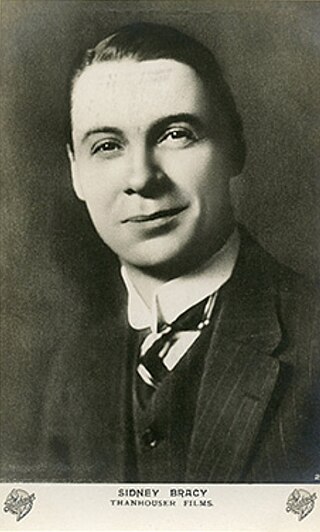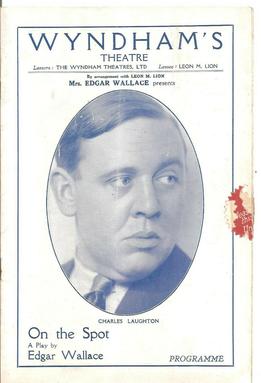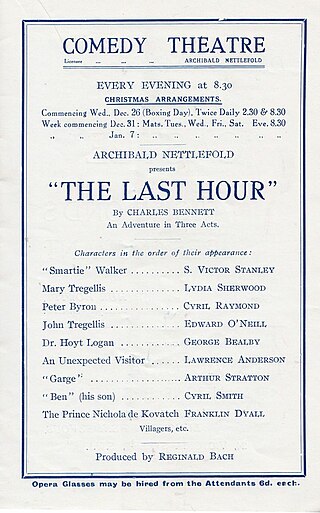Related Research Articles

Stephen Umfreville Hay Murray was an English cinema, radio, theatre and television actor.

Machinal is a 1928 play by American playwright and journalist Sophie Treadwell, inspired by the real-life case of convicted and executed murderer Ruth Snyder. Its Broadway premiere, directed by Arthur Hopkins, is considered one of the highpoints of Expressionist theatre in history of the American stage.

John Loder was established as a British film actor in Germany and Britain before migrating to the United States in 1928 for work in the new talkies. He worked in Hollywood for two periods, becoming an American citizen in 1947. After living also in Argentina, he became a naturalized Argentinian citizen in 1959.

Sidney Bracey was an Australian-born American actor. After a stage career in Australia, on Broadway and in Britain, he performed in more than 320 films between 1909 and 1942.

Footsteps in the Dark is a 1941 American comedy mystery film directed by Lloyd Bacon and starring Errol Flynn, Brenda Marshall and Ralph Bellamy. It was produced and distributed by Warner Bros. Flynn plays a novelist and amateur detective investigating a murder. It takes its title from the 1935 play Footsteps in the Dark by Ladislas Fodor and also used material from the 1937 play Blondie White by Jeffrey Dell.

The Unguarded Hour is a 1936 American drama film directed by Sam Wood and starring Loretta Young, Franchot Tone and Roland Young. In England, a prominent young prosecutor in a murder trial is unaware that his wife is involved.
Laburnum Grove is a comedy-drama play by the British writer J.B. Priestley which was first staged in 1933. It was one of Priestley's earliest hits. The play premiered at the Duchess Theatre on 28 November 1933. In its initial run it had over 300 performances. It made its Broadway debut at Booth's Theatre on 14 January 1935 and ran for 131 performances.
Bernard Lee (1908–1981) was an English actor who performed in many light entertainment media, including film, television and theatre. His career spanned from 1934 to 1981, although he made his first appearance on the stage at the age of six. He is perhaps best known for playing M in the first eleven Eon-produced James Bond films.

The Bat is a three-act play by Mary Roberts Rinehart and Avery Hopwood that was first produced by Lincoln Wagenhals and Collin Kemper in 1920. The story combines elements of mystery and comedy as Cornelia Van Gorder and guests spend a stormy night at her rented summer home, searching for stolen money they believe is hidden in the house, while they are stalked by a masked criminal known as "the Bat". The Bat's identity is revealed at the end of the final act.
Libel! is a play written by Edward Wooll. It debuted on 2 April 1934 at the Playhouse Theatre in London's West End, where it was directed by Leon M. Lion. Producer Gilbert Miller brought it to Henry Miller's Theatre on Broadway in December 1935, with Otto Preminger directing.

Clarence Blakiston was a British film and stage actor, comedian and singer who during his career across five decades played the title role in the Sherlock Holmes parody Sheerluck Jones, or Why D’Gillette Him Off at Terry's Theatre (1901–02) which ran for 138 performances and who appeared in the original production of The Admirable Crichton at the Duke of York's Theatre in 1902.

On the Spot is a 1930 Chicago-set play by the British writer Edgar Wallace. Wallace was inspired by a visit to the United States and, in particular, the Saint Valentine's Day Massacre. Known as a prolific author, he reportedly dictated the manuscript for the play in just four days. It was his greatest theatrical success.
The Calendar is a 1929 play by the British writer Edgar Wallace. It is a crime thriller set in the world of horse racing world, the sport being among Wallace's interests. The protagonist is a financially struggling racehorse owner with a shady reputation. It premiered at the Palace Theatre in Manchester before transferring to Wyndham's Theatre in the West End.
The Old Man is a 1931 mystery play by the British writer Edgar Wallace. Its original production was staged at Wyndham's Theatre in London's West End for a ninety performance run. It is set entirely in the "Coat of Arms" tavern where a mysterious old man lurks in the background, reputedly an escapee from a lunatic asylum. The original cast included Alfred Drayton, Jack Melford, Harold Warrender and Finlay Currie.
Persons Unknown is a 1929 mystery play by the British writer Edgar Wallace. The plot revolves around the murder of a "person unknown" in a street by a mysterious blackmailer. It features the character of Sergeant Elk, a Scotland Yard detective who appeared in several of Wallace's novels.
The Terror is a 1927 mystery thriller play by the British writer Edgar Wallace. It is based on Wallace's 1926 novel The Black Abbot.

The Amazing Dr. Clitterhouse is a 1936 thriller play by the British writer Barré Lyndon. The lead character's name is a play on the term for the female sexual organ the clitoris - a name characterised by the "yearning, untrammelled nature" of Clitterhouse himself; an extremely daring pun for 1936, yet seemingly anticipated by Lyndon to escape the notice of the contemporary censor. Lyndon wrote, "My view was that he was no more likely to locate the pun in my title as to locate the source of it on his beloved bedfellow".

The Last Hour is a 1928 comedy thriller play by the British writer Charles Bennett. At an inn on the coast of Devon, a secret agent battles a foreign prince trying to smuggle a stolen death ray out of the country.

Blackmail is a 1928 thriller play by the British writer Charles Bennett. In Chelsea, an artist's model kills an artist when he attempts to assault her.
References
- ↑ Kabatchnik p. 172
- ↑ Wearing p.577
- ↑ Radio Times, Issue 1020, 18 April 1943, p. 18